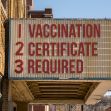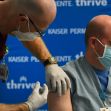As schools and workplaces prepare for post-COVID-19 reopening, people are increasingly concerned about new laws that could impose mandatory vaccination requirements. They wonder whether children and employees will be subject to mandates that call for shots in arms.
To understand the complexity of pertinent regulations, it is necessary to review fundamental jurisdictional rules. First, the Food and Drug Administration (FDA), the federal agency that is charged with “ensuring the safety, efficacy, and security of drugs…” does not mandate any vaccinations. State or local governments make all the rules, but most follow recommendations from the FDA and the Centers for Disease Control and Prevention (CDC).
Currently, all 50 states require some vaccinations for students. But exemptions are available. All states recognize the need for medically-based exemptions and 45 states and Washington D.C. permit religious exemptions as well. The CDC’s Advisory Committee on Immunization Practices lists and describes 23 different vaccinations and gives detailed information on the value and need for each.
As of now, three COVID-19 vaccines have received Emergency Use Authorization (EUA) from the FDA. These are Johnson & Johnson’s Janssen COVID 19 (approved March 2, 2021), Moderna, and Pfizer-BioN Tech (both approved December 2020). As of February 27, 2021, Phase 3 clinical trials for AstraZeneca and Novavax vaccines are in progress. At this time, no state requires children or teachers to receive a COVID-19 vaccine in order to go to school.
However, most states follow other CDC recommendations for vaccinations according to age. A sample of state laws shows that vaccinations that protect against diseases such as chickenpox, diphtheria, tetanus and pertussis (DTaP), hepatitis A and B, measles, mumps, rubella (MMR), pneumococcal, polio and rotavirus are often required for school attendance. In most states, entering students must show certificates of immunization before they will be allowed to go to school and, in some cases, pre-school. Such school and day-care immunization requirements provide a “safety net” for those who were not immunized when they were babies or young children.
States and localities have no authority to order vaccines for their adult population. But they do enact laws that govern employers’ ability to require or mandate COVID-19 vaccinations for their workers. Normally, new employees might have to show proof of vaccination for a pharmacy or health care provider.
State laws that require vaccination also permit exemptions for medical, religious, personal or moral reasons. Those likely to have adverse reactions due to existing medical conditions or allergies do not have to be vaccinated. Also, those who wish to decline inoculations due to religious beliefs may get exemptions unless they live in California, Maine, Mississippi, New York or West Virginia. Of the 45 other states that permit religious exemptions, 15 of them also permit exemptions based on “personal, moral or other beliefs.”
Thus far, no states have implemented policies regarding COVID-19 vaccines. But the CDC cites an N1H1 (e.g., swine flu) policy from the Equal Employment Opportunity Commission (EEOC), enacted in December 2020, that may be used as protocol. The EEOC policy exempts those covered by the Americans with Disabilities Act (ADA) from vaccination. Employers covered under Title VII of the Civil Rights Act of 1964 must “provide a reasonable accommodation unless it would pose an undue hardship” for employees who hold sincere religious believes that prevent him (sic) from taking the influenza vaccine.
For employers covered under Title VII of the Civil Rights Act of 1964, the regulations state, “once an employer receives notice that an employee’s sincerely held religious belief, practice, or observance prevents him from taking the influenza vaccine, the employer must provide a reasonable accommodation unless it would pose an undue hardship.”
The CDC concludes its exemption explanation by saying employers “should consider simply encouraging employees to get the influenza vaccine rather than requiring them to take it.”
The EEOC has classified the current coronavirus pandemic as a “direct threat,” defined as a disease that is a significant risk to the health or safety of the individual or others that cannot be eliminated or reduced by reasonable accommodation." Due to this classification, new employees may be required to have medical examinations after they get a job offer. On the job, they may be required to wear personal protective gear unless they are exempt due to an ADA disability or religious belief.
The federal government also plays a critical role in covering the cost of 95% of all vaccines through the Vaccines for Children Program that covers uninsured children or those who are federally-qualified for other reasons and the Pubic Health Services Act, which provides grants to states. Many states provide additional funds.
To summarize, federal regulations offer guidelines, but states make laws. These laws, though generally followed, can be controversial, as some parents fear that the shots may harm their children. As a result, the CDC says, “Many states have exemption laws to accommodate those who may object to immunization mandates.”
While public health officials and state legislators regularly promote the life-saving value of immunization, the phenomenon of “vaccine hesitancy” is trending on social media networks and threatening to undermine public safety.
Unfortunately, some of these fears are fueled by social media campaigns. BMJ, the publisher of more than 70 medical and allied science journals, extensively studied the effects of social media, especially Twitter, on global vaccine hesitancy. They concluded, “There is a significant relationship between organisation [sic] of social media and public doubts of vaccine safety.” In addition, the World Health Organization (WHO) lists the “reluctance or refusal to be vaccinated because of safety concerns—as one of the top 10 threats to world health.”
WHO calls for an active response from public health professionals. “Combating social media disinformation regarding vaccines is critical to reversing the growth in vaccine hesitancy around the world,” the authors conclude. “These findings are especially salient in the context of the current pandemic, given that COVID-19 vaccines will require deployment globally to billions of people. Policymakers need to begin planning now for ways to work against the patterns found in this study.”






